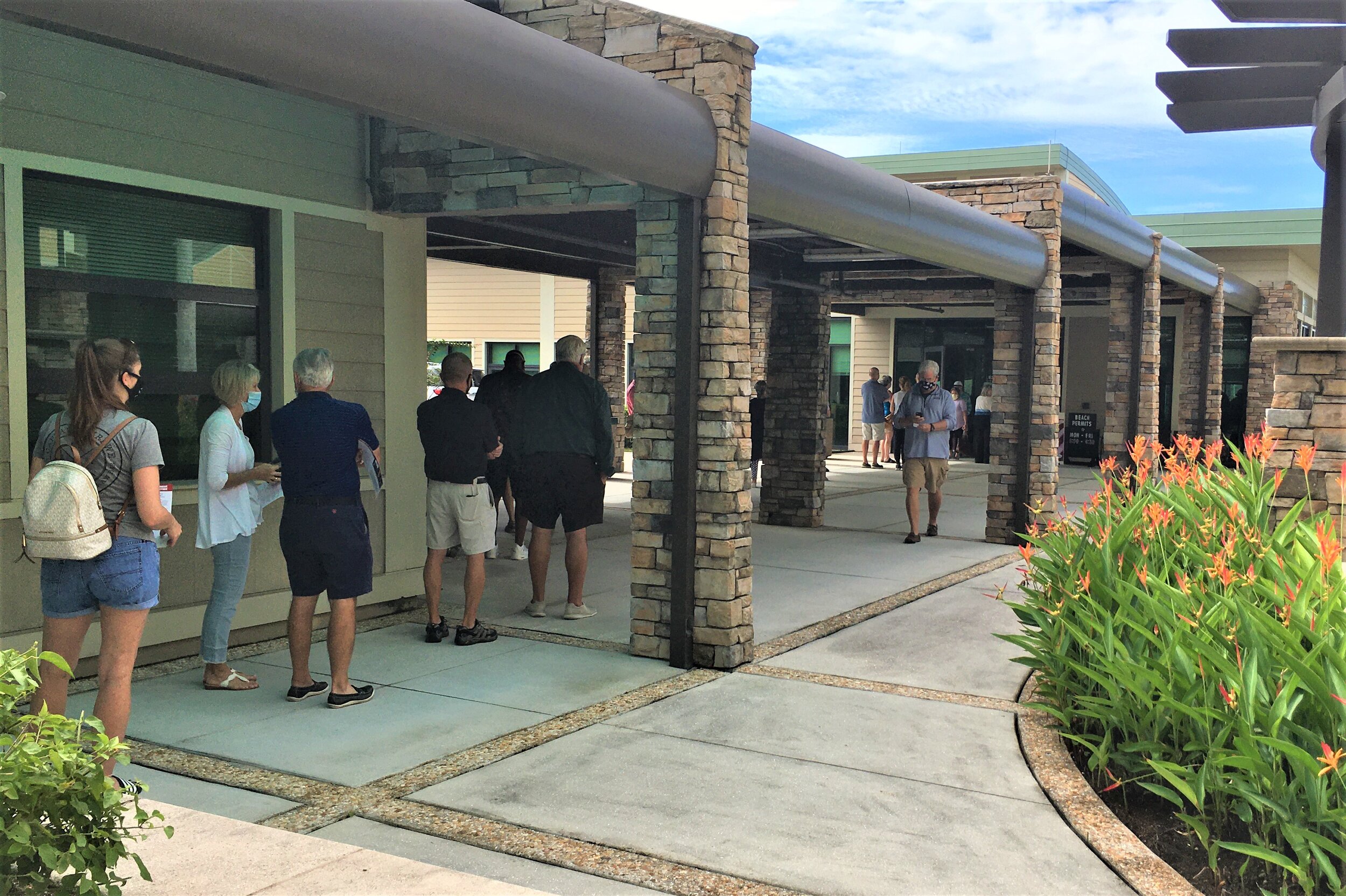Voters in line at North Collier Regional Park today, Oct. 22. (Photo: Author)
Oct. 22, 2020 by David Silverberg
Incidents of voter intimidation are now being reported in Southwest Florida.
However, there are no clear guidelines to voters on how to respond. This posting will provide some recommendations based on general research, official information and past experience.
Voter intimidation and harassment with the aim of preventing voting is a federal crime and is defined as activities that “intimidate, threaten, or coerce, any other person for the purpose of interfering with the right of such other person to vote or to vote as he may choose.”
The incidents to date
Yesterday, Oct. 21, local Democrats were among people in Florida and Alaska who reported e-mails reportedly from the far right Proud Boys organization telling people they were “in possession of all your information” and “You will vote for Trump on Election Day or we will come after you.”
The Federal Bureau of Investigation (FBI) attributed the e-mails to Iranian interference and John Ratcliffe, director of national intelligence, told a press conference that both Russia and Iran had obtained voter information that could interfere in the election.
In Collier County, Jennifer Edwards, election supervisor, tweeted: “The Collier County Supervisor of Elections is aware of multiple instances of voter intimidation via email. We are in contact with & working in conjunction with our law enforcement partners at the local, state and federal level, including the FBI, DHS [Department of Homeland Security] & the FL Dept of State.
“If any individual engages in any form of voter intimidation, we will refer the case to state and federal law enforcement. We are committed to providing a safe and secure voting process for all voters. For more information, contact us at (239) 252-8683.”
Trish Robertson, public relations officer for the Collier County elections office, expanded on that to The Paradise Progressive. “…individuals who feel that they are being intimidated in Collier County should contact us right away,” she wrote in an e-mail. Usually, supporters of a party or candidate may just be too exuberant. However, if someone is overly aggressive after talking to an election officer, the office will reach out to the candidate or party to stop the activity. “If we still receive complaints we will contact local law enforcement. Very rarely do we call law enforcement,” she wrote.
As for clothing and paraphernalia at election sites, which some voters have complained is too partisan, “Locally, voters can wear campaign gear in the polling room (passive campaigning); however, they cannot cause a disruption to the voting process or actively campaign for a candidate within the non-solicitation zone.”
In Lee County a voter standing in line at the Bell Tower shops posted a description of an incident on Facebook:
“Ft Myers: election center workers just kicked a caravan of Trumpers off property,” she wrote yesterday afternoon. “They were driving around and around those of us standing in line. They had Trump flags and what-not all over their pickups, seemingly intimidating voters or riling up fellow supporters. Either way the people in charge gave them the boot and told them to stop.”
She elaborated that the polling place “was the one on [Route] 41 by Bell Tower. They [the Trumpers] never got out of their truck or anything but they were slow creeping past those of us standing outside in the line. The election people came RUNNING out, signaling ‘stop!’ stood in their path, pointed to the exit street, there was an exchange of words (I was too far away to hear) and then the lady again pointed to them towards the exit street and they left.”
How to respond
With all election interference, intimidation and suppression illegal at both the federal and state levels, digital, verbal or physical incidents should be immediately reported to three authorities:
The local police;
The election officials on site;
The Supervisor of Elections Office.
Digital threats or intimidation:
DO NOT open any attachments or links in a threatening or suspect e-mail.
Digital threats can be forwarded to the Lee County Supervisor of Elections at Elections@lee.vote or the Collier County Supervisor of Elections at SupervisorOfElections@CollierCountyFL.gov. These authorities will pass the e-mail on to the appropriate law enforcement authorities.
Physical incidents:
STAY SAFE and DO NOT PUT YOURSELF IN DANGER.
If possible, call 911 and describe the emergency as “voter intimidation” and “immediate physical threat” if appropriate.
Clearly describe the location of the incident in as much detail as possible and remember: the 911 dispatcher cannot detect your location.
Additional details to provide authorities:
The number of people intimidating or threatening voters;
Tell authorities whether they are armed or not;
Try to note a leader if there is a group.
If a vehicle is involved, safely try to note or photograph the license plate. This is the most important detail you can provide police regarding a vehicle.
If it is safe to do so, try to photograph or video the incident to the greatest extent possible and provide the images to police, authorities and responsible media.
Beyond the polling place
Complaints about official voting improprieties can be reported at the federal level to the Department of Justice’s Civil Rights Division at 800-253-3931 or 202-307-2767 or sent by e-mail to voting.section@usdoj.gov. Civil rights complaints can be filed online. Tips on crimes can be sent directly to the FBI.
A non-governmental organization fighting voter intimidation and suppression is the Campaign Legal Center. It runs an Election Protection Hotline at 866-OUR-VOTE (866-687-8683).
Liberty lives in light
©2020 by David Silverberg
